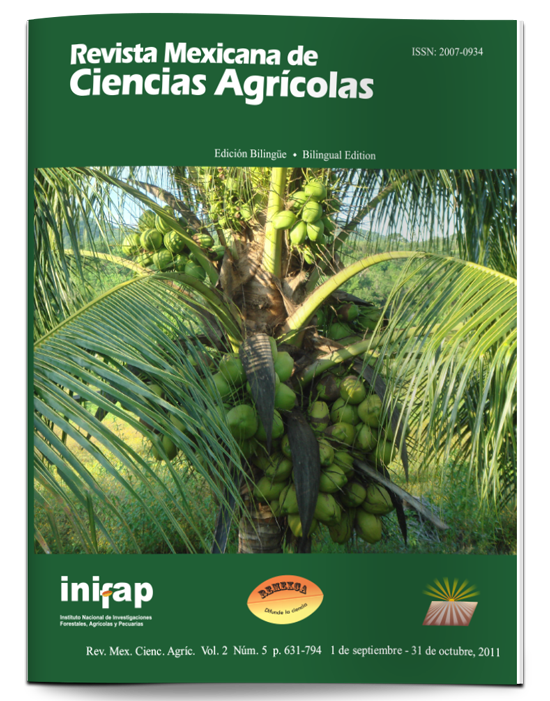VARIATION IN TOLERANCE TO DISINFECTANTS OF ELITE GENOTYPES OF Coffea spp. CULTIVATED in vitro
DOI:
https://doi.org/10.29312/remexca.v2i5.1615Keywords:
Coffea arabica L., Coffea canephora P., embryogenesisAbstract
The somatic embryogenesis can be affected by explants’ oxidation when a common method of disinfection is. In the Experimental Field Rosario Izapa in 2006, the tolerance to disinfectants of leaf explants of coffee genotypes was determined by the median lethal dose (LD50) and based on its tolerance the optimal disinfectant for aseptic establishment was defined. The LD50 of sodium hypochlorite (NaClO), calcium hypochlorite (Ca[ClO]2) and the combination of both in leaf explants of Coffea canephora P. genotypes (INIFAP 95-8, 95-9, 97-10, 97-12, 97-15, 97-18, 97-19, 97-20, 00-24 and 00-28) and genotypes of C. arabica L. (INIFAP 2000- 1018, 2000-1128 and 2000-692), was determined by applying eight concentrations of NaClO (0.1, 0.5, 1, 1.5, 2, 2.5, 3, 3.5%), eight concentrations of Ca(ClO )2 (3, 4, 5, 6, 7, 8, 9 and 10%) and the combination. Based on the tolerance, disinfection treatments were applied: 1, 3 and 6% of NaClO, 3.5, 7 and 10.5% of Ca (ClO)2 and control’s combination of 3 and 7% NaClO and Ca(ClO)2, respectively. There was variability in the tolerance, since LD50 varied depending on genotype and disinfecting agent. Most genotypes were less tolerant to NaClO (LD50 from 2 to 4%); however, NaClO controlled pollution and oxidation at low doses (1 and 3%). NaCl and Ca(ClO)2 at low concentrations up to 2 and 3.5% respectively, these are an option for coffee explants disinfection that can ensure proper physiological state to initiate the embryogenesis.
Downloads
Downloads
Published
How to Cite
Issue
Section
License
The authors who publish in Revista Mexicana de Ciencias Agrícolas accept the following conditions:
In accordance with copyright laws, Revista Mexicana de Ciencias Agrícolas recognizes and respects the authors’ moral right and ownership of property rights which will be transferred to the journal for dissemination in open access. Invariably, all the authors have to sign a letter of transfer of property rights and of originality of the article to Instituto Nacional de Investigaciones Forestales, Agrícolas y Pecuarias (INIFAP) [National Institute of Forestry, Agricultural and Livestock Research]. The author(s) must pay a fee for the reception of articles before proceeding to editorial review.
All the texts published by Revista Mexicana de Ciencias Agrícolas —with no exception— are distributed under a Creative Commons License Attribution-NonCommercial 4.0 International (CC BY-NC 4.0), which allows third parties to use the publication as long as the work’s authorship and its first publication in this journal are mentioned.
The author(s) can enter into independent and additional contractual agreements for the nonexclusive distribution of the version of the article published in Revista Mexicana de Ciencias Agrícolas (for example include it into an institutional repository or publish it in a book) as long as it is clearly and explicitly indicated that the work was published for the first time in Revista Mexicana de Ciencias Agrícolas.
For all the above, the authors shall send the Letter-transfer of Property Rights for the first publication duly filled in and signed by the author(s). This form must be sent as a PDF file to: revista_atm@yahoo.com.mx; cienciasagricola@inifap.gob.mx; remexca2017@gmail.
This work is licensed under a Creative Commons Attribution-Noncommercial 4.0 International license.



